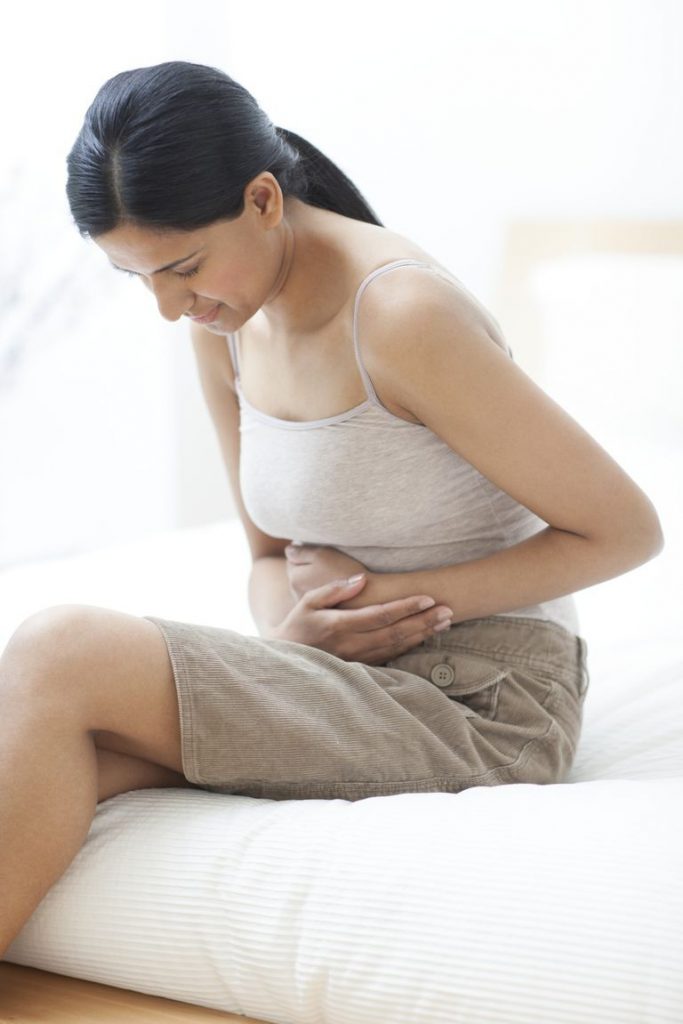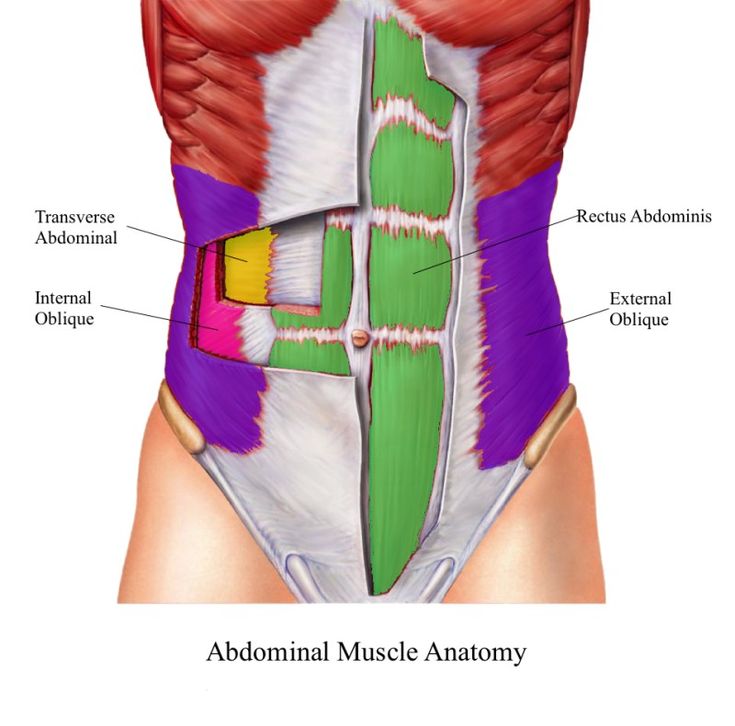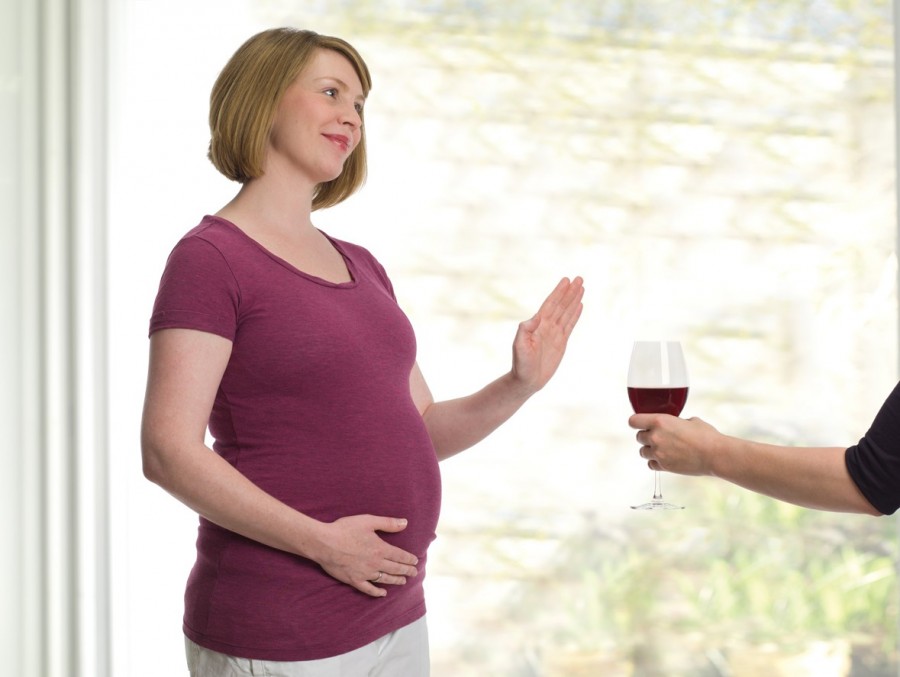Pregnancy week seventeen
17 Weeks Pregnant | Pregnancy
When you're pregnant, you have lots of questions. Our week-by-week pregnancy guide is packed with lots of useful information. From what's happening inside your body, to how your baby is developing, and tips and advice on having a healthy pregnancy – this is your one-stop pregnancy guide!
- 1st trimester
- 2nd trimester
- 3rd trimester
Our week-by-week pregnancy guide is full of essential information. From staying fit in pregnancy to advice on your maternity rights, you'll find it all here.
- Week 13
- Week 14
- Week 15
- Week 16
- Week 17
- Week 18
- Week 19
- Week 20
- Week 21
- Week 22
- Week 23
- Week 24
- Week 25
- Week 26
- Week 27
You might start to feel your baby move now. You will not be able to tell exactly what your baby's up to, but soon you could be feeling every kick, punch, hiccup and somersault.
What's happening in my body?
Week by week, your baby's getting bigger, and so is your placenta, which is feeding your baby and also removing waste. By the end of your pregnancy the placenta will weigh around 500g, which is as heavy as a packet of pasta.
Your waist will start to vanish as your womb moves up and out of your pelvis. This will make you look more obviously pregnant.
Around 1 in 10 women feel stressed or anxious during their pregnancy, and hormones can make even small problems feel overwhelming. If you feel sad or worried, talk to your doctor or midwife – there's a big support network out there for you.
Your baby's movements
Many women spot the first signs of their baby moving between 18 and 24 weeks. Inside your tummy, you might feel:
- bubbling
- fluttering
- rolling
You might find that your baby moves more:
- after meals
- when you listen to loud music
- when you rub your tummy and talk to your baby
- when you are relaxing
Tommy's has information about baby movements in pregnancy.
Stretch marks
At some point, you might notice red or purple streaks over your stomach and breasts. You could also spot them on your bottom and thighs. These are stretch marks and affect up to 8 in 10 women.
They are usually caused by hormones and your skin stretching. They usually fade to silver and become much less noticeable after your baby is born.
Read more about stretch marks on the NHS website.
2nd trimester pregnancy symptoms (at 17 weeks)
You may be getting a few aches and pains as your bump gets bigger. Your symptoms should be manageable, but talk to your doctor or midwife if they're not.
Your signs of pregnancy could include:
- tiredness and sleeping problems (week 19 has information about feeling tired)
- swollen and bleeding gums (week 13 has information about gum health during pregnancy)
- pains on the side of your belly, caused by your expanding womb (known as 'round ligament pains')
- headaches
- nosebleeds
- bloating and constipation (read about bloating on week 16's page)
- indigestion and heartburn (week 25 talks about digestive problems)
- sore breasts
- leg cramps
- feeling hot
- dizziness
- swollen hands and feet
- urine infections
- vaginal infections (see week 15 for vaginal health)
- darkened skin on your face or brown patches – this is known as chloasma or the "mask of pregnancy"
- greasier, spotty skin
- thicker and shinier hair
You may also experience symptoms from earlier weeks, such as:
- morning sickness (read about dealing with morning sickness on week 6's page)
- weird pregnancy cravings (read about pregnancy cravings on week 5's page)
- a heightened sense of smell
- mood swings (week 8's page has information on mood swings)
- a white milky pregnancy discharge from your vagina and light spotting (seek medical advice for any bleeding)
Read Tommy's guide to common pregnancy symptoms.
What does my baby look like?
Your baby, or foetus, is around 12cm long, from head to bottom, and weighs around 150g. That's roughly the size of a pomegranate and the weight of a ball of mozzarella.
Your baby can:
- move their eyes, although they'll stay shut for now
- react to loud noises
- open and close their mouth
Your baby's fingernails are starting to grow and will have their own unique fingerprints. Even identical twins have different fingerprints.
Action stations
Have you decided where you'd like to give birth? Read more about choosing a hospital, midwife-led unit or home birth. Talk to your doctor or midwife about your local options. It's a big decision but you can always change your mind later.
You don't have to tell your employer for several more weeks, but as soon as you do, you will have maternity rights and can attend antenatal appointments during paid work time. You can also ask for a risk assessment of your work place to ensure that you're working in a safe environment.
It's a good time to tone up your pelvic floor muscles. Gentle exercises can help to prevent leakage when you laugh, sneeze or cough. Get the muscles going by pretending that you're having a wee and then stopping midflow. Visit Tommy's for more ideas on pelvic floor exercises
Ask your midwife or doctor about online antenatal classes – they may be able to recommend one. The charity Tommy's has lots of useful information on antenatal classes and preparing you for birth.
Even if you've had children before, they're still worth going to as you can meet other parents-to-be. The NCT offers online antenatal classes with small groups of people that live locally to you.
To keep bones and muscles healthy, we need vitamin D. From late March/early April to the end of September, most people make enough vitamin D from sunlight on their skin. However, between October and early March, you should consider taking a daily vitamin D supplement because we cannot make enough from sunlight.
Some people should take a vitamin D supplement all year round, find out if this applies to you on the NHS website. You just need 10 micrograms (it's the same for grown-ups and kids). Check if you're entitled to free vitamins.
It's recommended that you do 150 minutes of exercise a week while pregnant. You could start off with just 10 minutes of daily exercise - perhaps take a brisk walk outside. Check out Sport England's #StayInWorkOut online exercises (scroll to the pregnancy section). Listen to your body and do what feels right for you.
There's no need to eat for 2. You don't need any extra calories until the third trimester, which starts in week 28. Try to eat healthily, with plenty of fresh fruit and veg, and avoid processed, fatty and salty foods. You may be able to get free milk, fruit and veg through the Healthy Start scheme.
You and your family should follow the government and NHS guidance on coronavirus (COVID-19):
To find out about about COVID-19 and pregnancy, childbirth and breastfeeding, have a look at advice on the:
Go back to week 16
Go to week 18
Dizziness during pregnancy: Causes, prevention, and treatment
Dizziness in pregnancy is common, due to the cardiovascular changes you experience during pregnancy, but not to worry – there are tactics that may help. That includes lying down as soon as you feel dizzy, taking warm baths instead of hot ones, and not standing up too fast. And just watch out for other symptoms that can accompany dizziness and warrant a prompt a call to your doctor, including shortness of breath, blurred vision, and impaired speech.
That includes lying down as soon as you feel dizzy, taking warm baths instead of hot ones, and not standing up too fast. And just watch out for other symptoms that can accompany dizziness and warrant a prompt a call to your doctor, including shortness of breath, blurred vision, and impaired speech.
Why am I experiencing dizziness in pregnancy?
You might occasionally feel lightheaded or dizzy when you're pregnant because your cardiovascular system undergoes dramatic changes: Your heart rate goes up, your heart pumps more blood per minute, and the amount of blood in your body increases by 30 to 50 percent.
In most pregnancies, the blood vessels dilate and blood pressure gradually drops, reaching the lowest point in mid-pregnancy. It then begins to go back up, returning to its regular level by the end of pregnancy. In the second and third trimesters, a growing uterus also puts pressure on veins and slows circulation to the lower half of your body.
Your cardiovascular and nervous systems can usually adjust to these changes and maintain adequate blood flow to your brain.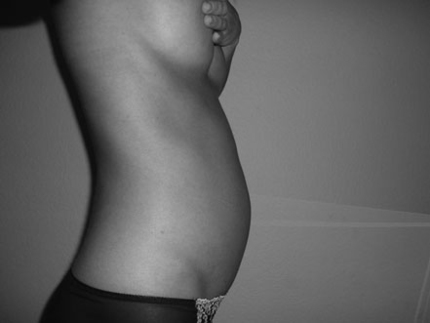 But sometimes they don't adapt quickly enough, which can leave you feeling lightheaded or dizzy, or even make you faint.
But sometimes they don't adapt quickly enough, which can leave you feeling lightheaded or dizzy, or even make you faint.
You're also more likely to feel dizzy if you have anemia, don't eat or drink enough, overdo it when you exercise, or get overheated.
What's the difference between feeling lightheaded and dizzy?
Although these terms are sometimes used interchangeably, they're distinct from each other. Lightheadedness happens when you feel faint, and your body might seem heavy while your head feels too light. Dizziness, which is also called vertigo, makes you feel like your surroundings are moving and that can often lead to nausea.
With vertigo in pregnancy, you may feel off balance or like you're spinning or tilting. This might also be accompanied by headaches or vision issues.
Dizziness in early pregnancy: Will it just occur in the first trimester?
Feeling lightheaded or dizzy during early pregnancy is not as common as changes like sore breasts, morning sickness, fatigue, and frequent urination. But it's still considered normal because of increasing blood volume along with hormonal changes.
But it's still considered normal because of increasing blood volume along with hormonal changes.
Those hormone shifts cause your blood vessels to relax and widen, which bring more blood to your baby, but slow how much flows back to you. That prompts a dip in blood pressure that can cause dizziness. Low blood sugar levels may also be a culprit, because your body is trying to regulate those levels in the first trimester.
Although dizziness can be more acute in the first trimester and less frequent in your second trimester, it can also occur later in pregnancy, especially if you lie on your back. That's because the weight of the baby is pressing on your vena cava, the large vein carrying blood to your heart from your lower body.
Can certain health conditions cause dizziness in pregnancy?
You can have vertigo in pregnancy, but other less common causes of dizziness during pregnancy may not be as easy to spot. Those can include:
Vasovagal syncope: Some people get dizzy when they strain to cough, pee, or have a bowel movement. These actions can prompt blood pressure and heart rate to fall, leading to dizziness and fainting. (Vasovagal means your vagus nerve is affecting your circulatory system; syncope means fainting.) Dehydration, anxiety, and pain can also be triggers.
These actions can prompt blood pressure and heart rate to fall, leading to dizziness and fainting. (Vasovagal means your vagus nerve is affecting your circulatory system; syncope means fainting.) Dehydration, anxiety, and pain can also be triggers.
Pregnant women are more prone to vasovagal syncope. Besides lightheadedness, it's often preceded by warning signs such as a feeling of warmth, paleness, sweating, nausea, yawning, and hyperventilation. Pay attention to these symptoms and lie down immediately to try to keep yourself from fainting.
Anemia: If you're anemic, you don't have as many red blood cells to carry oxygen to your brain and other organs, which can make you feel lightheaded. Iron deficiency is the most common cause of anemia, so be sure to eat an iron-rich diet and take a prenatal vitamin with iron, especially in your second and third trimesters. If you're anemic, your provider may prescribe a separate iron supplement as well.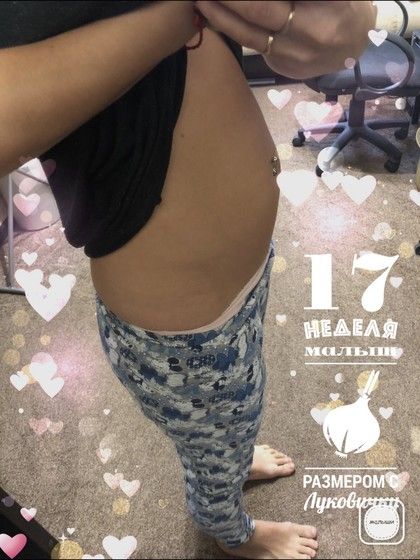
Anxiety: When you feel anxious, you may hyperventilate and get lightheaded. See our article on managing stress and anxiety during pregnancy for advice on reducing stress. If nothing seems to help, ask your healthcare provider to refer you to a therapist for help figuring out what you need to do to feel better.
What can I do if I'm experiencing dizziness or lightheadedness in pregnancy?
Lie down as soon as you start to feel dizzy. Lying on your side maximizes blood flow to your body and brain, which may keep you from fainting and could relieve lightheadedness altogether.
If you're someplace where you can't lie down, then sit down so you don't fall. Try to put your head between your knees. (Of course, you may no longer be able to do this if you're very pregnant.)
If you're doing anything that might put you or others at risk for injury, such as driving, pull over and stop right away.
Other strategies include taking deep breaths, opening windows or going outside so you get fresh air, and loosening tight clothing.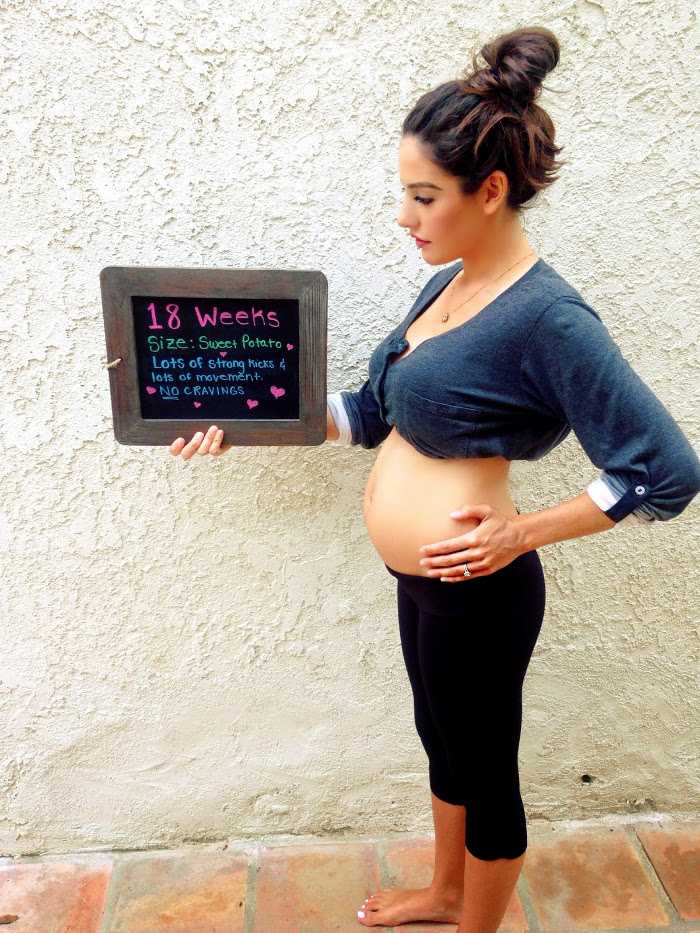
Can I prevent dizziness in pregnancy?
You can take steps to minimize the risk of dizziness during pregnancy. Here are some common causes of lightheadedness during pregnancy as well as the precautions you can take:
Don't stand up too fast. When you sit, blood pools in your feet and lower legs. If your body isn't able to adjust when you stand up, not enough blood returns to your heart from your legs. As a result, your blood pressure drops quickly, which can leave you feeling faint.
To prevent this, avoid springing up from your chair or bed. When you're lying down, sit up slowly and stay seated for a few minutes with your legs dangling over the side of the bed or couch. Then slowly rise from sitting to standing.
Your blood may also pool in your feet and legs when you stand in one place for a long time. If you're in a situation where you can't move around, try shaking your legs to promote circulation.
Wearing support stockings can also help circulation in the lower half of your body.
Don't lie on your back. In your second and third trimesters, your growing uterus can slow the circulation in your legs by compressing the large vein (inferior vena cava) that returns blood from the lower half of the body to the heart and the pelvic veins. Lying flat on your back can make this problem worse.
About eight percent of pregnant women in their second or third trimester develop a condition called supine hypotensive syndrome. If you have this condition, it means that when you lie on your back, your heart pumps less blood and your blood pressure drops, so you may feel anxious, lightheaded, and nauseated until you shift position.
To prevent this problem, lie on your side instead of flat on your back. A pillow placed behind you or under your hip can help you stay on your side (or at least tilted enough to keep your uterus from compressing the vena cava).
Eat and drink regularly. When you don't eat enough, you can end up with low blood sugar (hypoglycemia), which can make you feel dizzy or faint. This can happen much more easily when you're pregnant. Keep your blood sugar from getting too low by eating small meals frequently during the day instead of three large ones. Carry healthy snacks to eat when you get hungry on the go.
This can happen much more easily when you're pregnant. Keep your blood sugar from getting too low by eating small meals frequently during the day instead of three large ones. Carry healthy snacks to eat when you get hungry on the go.
Dehydration can have a similar effect, so stay well hydrated by drinking plenty of water. The Institute of Medicine recommends that pregnant women drink about 10 8-ounce cups of water or other beverages each day. You may need even more if you're exercising or it's hot. (If your urine is dark yellow or cloudy, you're not drinking enough.)
Avoid overheating. Spending time in a hot room or taking a hot bath or shower can make your blood vessels dilate, lowering your blood pressure and making you feel woozy.
If you feel dizzy when you get too hot, avoid stuffy, crowded places and dress in layers so you can shed clothes as necessary. Take warm showers or baths instead of hot ones, and try to keep the bathroom cool.
Don't overdo it when you exercise.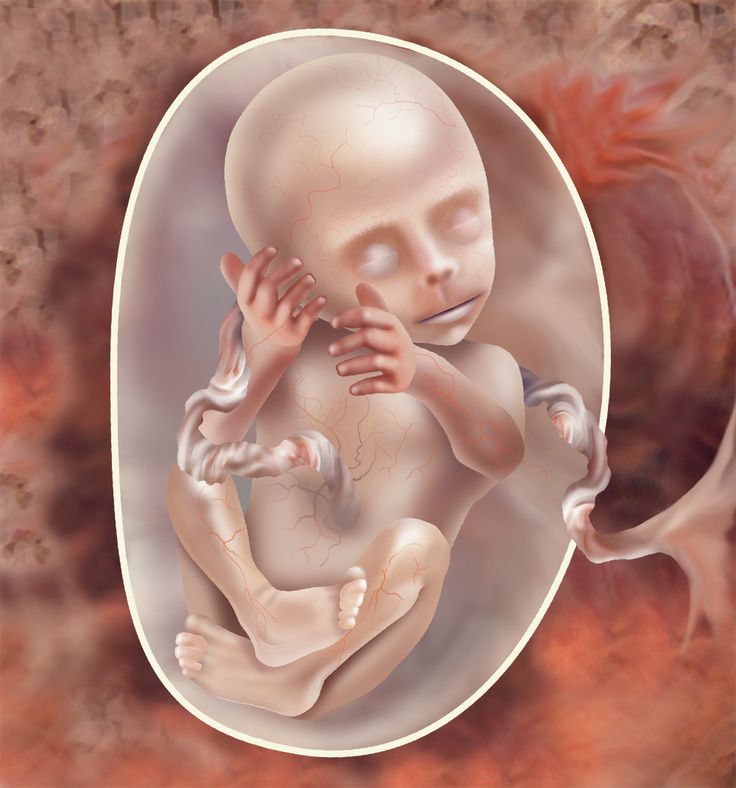 Exercise can sometimes cause you to hyperventilate and feel faint. Although exercise can help your circulation, be careful not to overdo it. Take it easy, and stop if you feel tired or unwell.
Exercise can sometimes cause you to hyperventilate and feel faint. Although exercise can help your circulation, be careful not to overdo it. Take it easy, and stop if you feel tired or unwell.
When should I call my healthcare provider about dizziness during pregnancy?
Feeling a little lightheaded on occasion from heat, hunger, or getting up too fast is generally not cause for alarm. But if you have persistent lightheadedness, frequent bouts of dizziness, or any other concerns, talk with your provider.
Also call your provider if you have any of these symptoms you shouldn't ignore:
- Severe headaches
- Blurred vision
- Impaired speech
- Palpitations
- Numbness
- Tingling
- Chest pain
- Shortness of breath
- Vaginal bleeding
Also, get immediate medical help if you faint, or if you're dizzy following a head injury. In early pregnancy, call 911 if you have dizziness with abdominal pain and a racing pulse. This could indicate that you could have a ruptured ectopic pregnancy, which is a medical emergency.
This could indicate that you could have a ruptured ectopic pregnancy, which is a medical emergency.
Learn more:
- Twelve steps to a healthy pregnancy
- The basics of good sleep during pregnancy
- Eating well during pregnancy
advertisement | page continues below
17th week of pregnancy: sensations, size and development of the fetus
PreviousNext
The baby's body begins to straighten and the legs become longer. This week, the baby already has eyebrows and eyelashes, as well as fluff all over his small body. However, if your baby is born at term, he will have time to shed his furry coat, which is officially called "lanugo".
At 17 weeks pregnant, your body's center of gravity shifts. Try to maintain the correct posture - this will help to avoid back pain and unnecessary muscle stress. If you need to lift something heavy, bend your knees and engage your thigh muscles. Lift with your feet, not your back.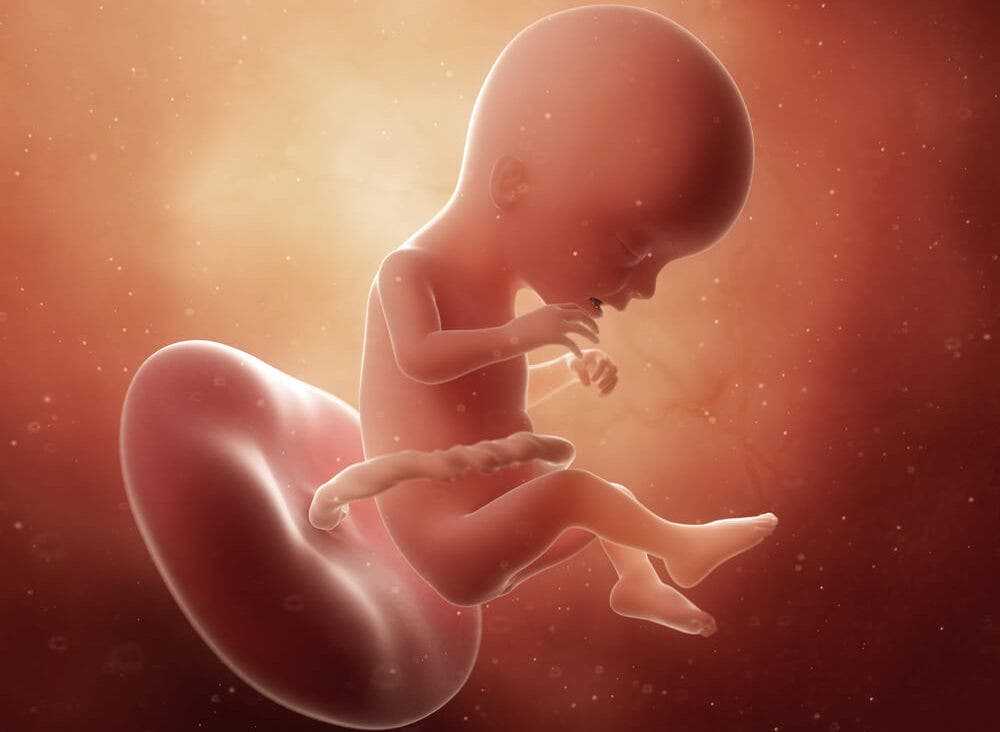
Some women experience pain in the sciatic nerve at this time. It comes out of the spine, goes along the buttocks and goes down both legs. The uterus and the baby in it can put pressure on this nerve, which is felt as a tingling or sharp pain in the legs or buttocks. Try to find a comfortable position, put pillows under your feet during sleep. If you lie on your side, bend the leg that is on top at the knee and put it on the pillow, most likely, the pressure from the sciatic nerve will be relieved.
Do not put pillows under your knees and do not lie in one position for a long time. This can lead to blood stasis and increase the risk of blood clots. When sitting, place your feet on a footstool or another chair.
From around this time, some women have to wear a maternity band to support their growing belly. Do not laugh! The supportive underwear is very comfortable. And no one except you and, possibly, the future dad, will know about it.
Mom, take me in your arms!
If you have a small child who needs to be constantly picked up, invite him to climb onto your lap on his own, and then give him a big hug.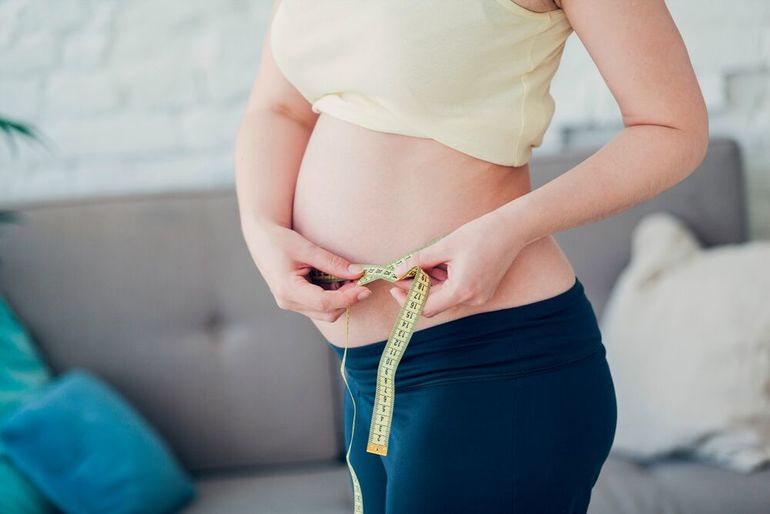 When you go outside with him, be sure to take a stroller. When you go to the store, put your child in the cart. Or choose a time for walking when your loved one can join you. Pilates, yoga, water aerobics and physiotherapy will help strengthen the muscles that support the spine in the correct position.
When you go outside with him, be sure to take a stroller. When you go to the store, put your child in the cart. Or choose a time for walking when your loved one can join you. Pilates, yoga, water aerobics and physiotherapy will help strengthen the muscles that support the spine in the correct position.
Physical changes at 17 weeks of gestation
-
Due to the increased volume of blood in the body, you may feel hot, even if it is the middle of winter. Look at your palms and see how close the blood rushes to the surface of the skin. Redness of the lines of the palm is one of the signs of pregnancy.
-
You may find that your legs hurt if you stand for a long time, and the veins on them become more noticeable. You may be more prone to varicose veins if you have already given birth, are overweight, or have a family history. Some women need to wear compression stockings to help the blood fight gravity and return to where it should be.
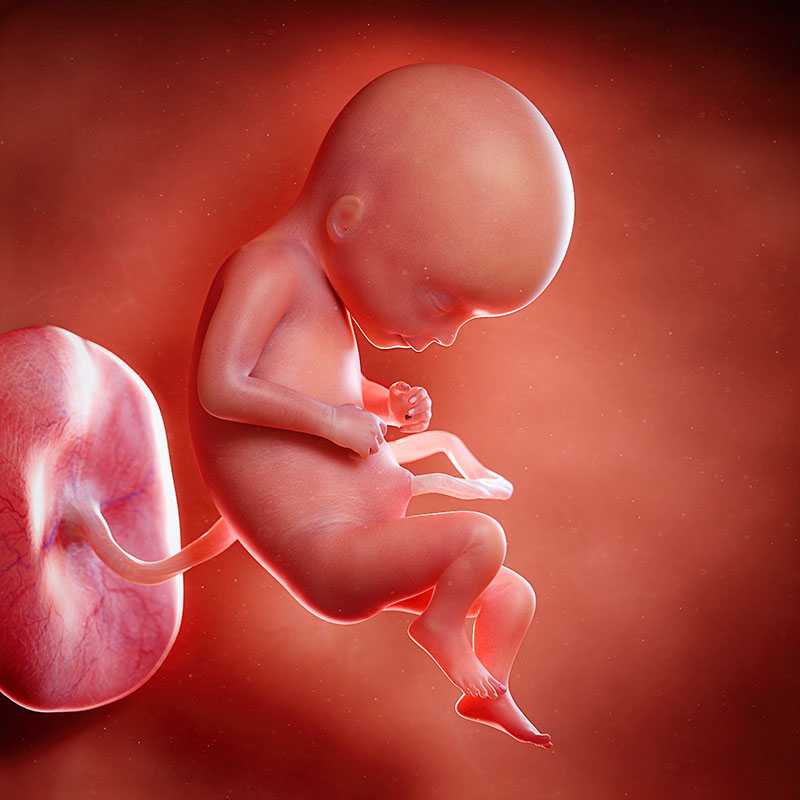 If you can, lie with your legs up more often, or at least sit.
If you can, lie with your legs up more often, or at least sit. -
Now your hair can appear in shampoo commercials. Usually hair grows and then falls out, but during pregnancy, the process of hair loss slows down. Hence your shiny curls.
-
At 17 weeks pregnant, your nails may look a little weird. Many women notice that during pregnancy their nails become brittle, weak and brittle. The nail hardener won't harm you or your child, just don't breathe in the fumes.
Emotional changes this week
-
A strange transitional period begins at week 17. You may still not look pregnant, but your regular clothes are getting too tight and you can't just put on something from your wardrobe. If a thing sits well on the stomach, it can look terrible in the chest area. Dressing has become more difficult, so go shopping! Do not underestimate the psychological effect of shopping therapy.
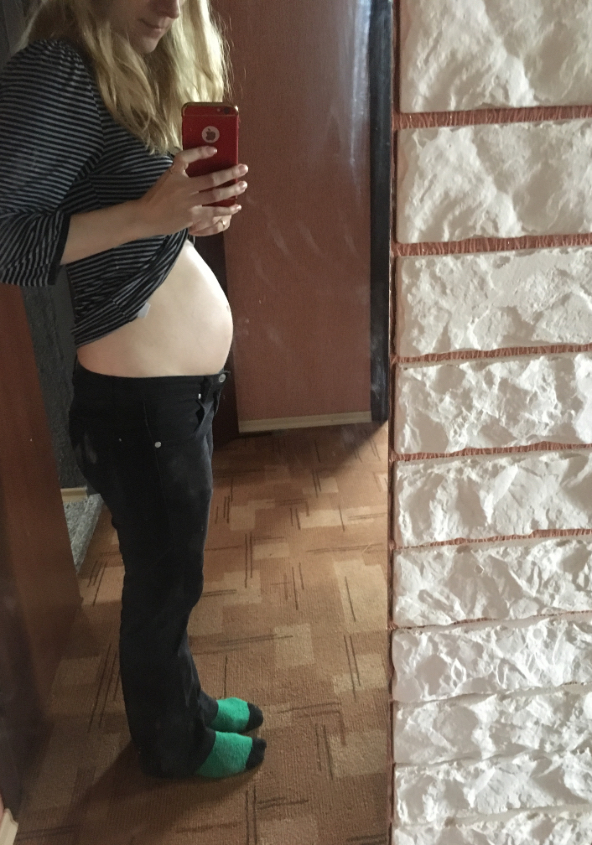
-
This week you may have doubts about your decision to have a baby. You can worry about whether you will become a good mother, and your loved one a good dad, remember how you were raised, and even wonder if you are capable of raising a child. Doubt can fill your mind, especially in the morning when your thinking skills are not at their best. Discuss this with your partner and try to calm down - such doubts appear in almost every pregnant woman.
-
If you have always been a free and independent person, this may be a difficult time for you. Perhaps from this period you will have to turn to your loved one for help more often. This does not mean that you have become addicted or less capable. Pregnancy is something that a married couple experiences together, and your partner, most likely, will only be glad to feel involved in it.
What happens to the baby at the seventeenth week of pregnancy
-
Your baby is growing very fast.
 In the last 2 weeks alone, his weight has doubled, and his body length is now about 13 cm from crown to tailbone.
In the last 2 weeks alone, his weight has doubled, and his body length is now about 13 cm from crown to tailbone. -
The child is still very thin - skin and bones. The blood vessels supplying his body with oxygen are visible through transparent skin. If you measure your pulse and double the resulting number, you will get an approximate heart rate for your baby.
-
The child's legs seem out of proportion to the rest of the body. They are longer than the arms and bend at the knees and ankles. Calcium is deposited in his small bones, so continue to lean on dairy products.
-
At this time, you can determine the sex of your baby using ultrasound. If you have a girl, her ovaries already have a lifetime supply of eggs—about 3 million. And the boy's testicles are still sitting in his stomach and have not descended. Small nipples begin to appear on the baby's chest.
-
Your baby's first milk teeth have formed inside the gums.
 They will play an important role in the development of the oral cavity. A small amount of fluoride that enters your body with drinking water will help the formation of strong enamel on the baby's teeth.
They will play an important role in the development of the oral cavity. A small amount of fluoride that enters your body with drinking water will help the formation of strong enamel on the baby's teeth. -
Your child may yawn and make faces. He still sleeps a lot, but periodically actively moves and trains his muscles.
-
The baby is forming fingerprints. No two people have the same fingerprint, and this is truly a unique trait that sets your child apart from any other.
Tips 18 weeks
-
Try not to get up too quickly - a sudden drop in blood pressure can lead to fainting. Rise slowly to give your body time to equalize the pressure.
-
If you wear glasses, visit an ophthalmologist. You may find that you need a new prescription. If you wear contact lenses, you may feel that they have become a little uncomfortable. During pregnancy, vision may change, but immediately after the birth of the child, everything usually returns to the way it was before.
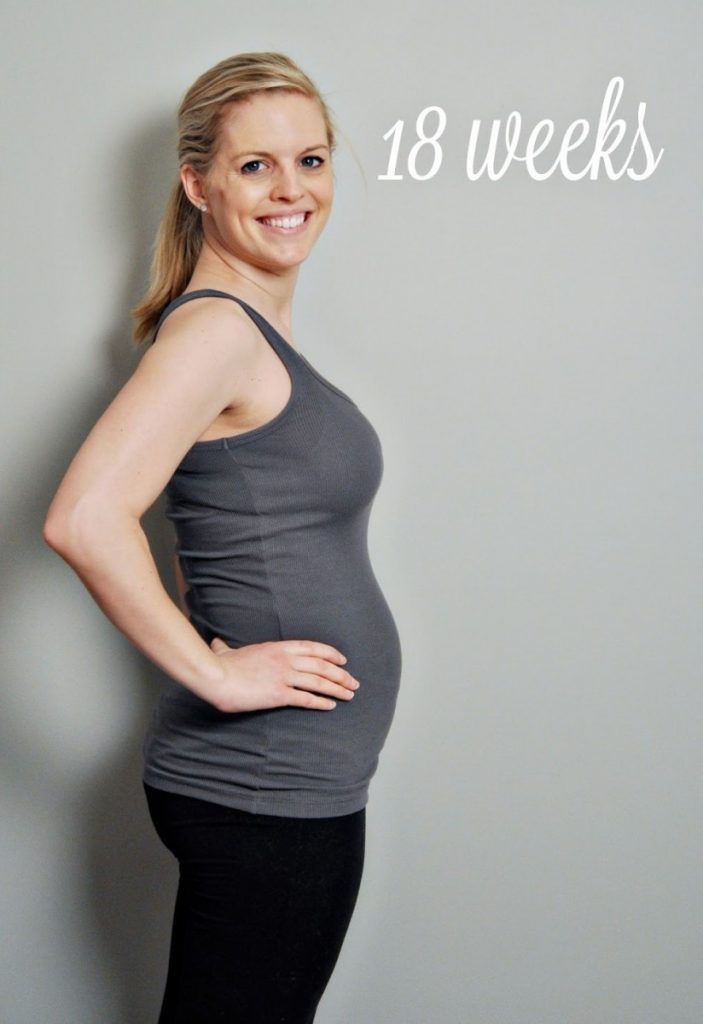
-
Be careful about hygiene. The rise in body temperature during pregnancy and friction can lead to irritation in the groin, under the breasts and armpits. Take a shower when necessary, change your underwear more often. Cotton helps the skin breathe and absorbs excess moisture well.
-
Before going to bed, lie still and try to focus on what is happening in your stomach. You may feel the first movements of the baby, but don't worry if you don't feel anything yet.
Most often, expectant mothers feel the first movements at the 18th week of pregnancy, and she is the next!
17-20 weeks of pregnancy
17th week
Baby
The 17th week of pregnancy is marked for the baby by an active increase in the mass of his muscles, their gradual strengthening, which allows him to move in the tummy more intensively and variously. Quite frequent movements of the limbs help the child train the muscles, as well as develop the joints of the knees and elbows. At this time, the handles are still clenched into fists, rarely unclenched, and only in order to capture the umbilical cord or suck a finger. Up to 17 weeks, the head of the fetus was practically motionless, rather low, and the chin was close to the chest. Strengthening the muscles of the dorsal and cervical region at this time allows the child to raise his head almost to a vertical position.
At this time, the handles are still clenched into fists, rarely unclenched, and only in order to capture the umbilical cord or suck a finger. Up to 17 weeks, the head of the fetus was practically motionless, rather low, and the chin was close to the chest. Strengthening the muscles of the dorsal and cervical region at this time allows the child to raise his head almost to a vertical position.
Internal organs continue to develop and improve. Their structure only becomes more complex, which contributes to the expansion of functionality. Their preparation will allow after the birth of the baby to begin normal, full-fledged functioning.
It is important to note the changes that occur in the system of blood vessels and heart of the fetus. The nerve plexuses that surround the heart give rise to the formation of the conduction system; its uniqueness lies in the fact that the heart does not need external signals to work. All internal organs of a person obey the central nervous system.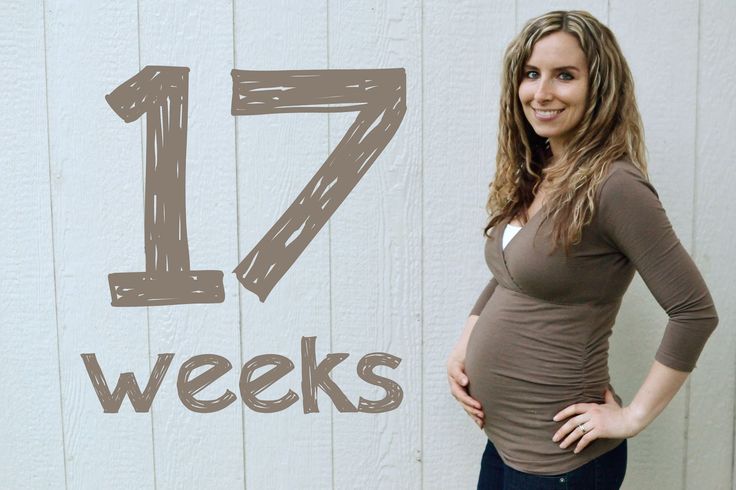 The brain sends certain instructions according to which each of the organs works. The heart, in turn, functions with the help of command signals that arise in itself and cause it to contract. The exceptionally autonomous mode of operation of the heart allows it not to depend on the level of activity of the central nervous system throughout a person's life.
The brain sends certain instructions according to which each of the organs works. The heart, in turn, functions with the help of command signals that arise in itself and cause it to contract. The exceptionally autonomous mode of operation of the heart allows it not to depend on the level of activity of the central nervous system throughout a person's life.
The 17th week of pregnancy is also characterized by the formation of the respiratory system, namely, the strengthening of the muscles of the lungs. Active respiratory contractions resemble inhalation and exhalation and thereby strengthen the muscles of the chest. There is also the formation of the alveolar apparatus of the lungs. Alveoli are presented in the human body in the form of small bubbles that are located on the surface of the respiratory apparatus and are responsible for gas exchange. Each breath contributes to the saturation of the blood with oxygen. At the 17th week, the alveoli are in a compressed state, but immediately after birth with the first breath, they will straighten out and be ready for normal functioning.
The weight of the fetus at this time is about 150 g, and the body length is 12-13 cm. Normal weight gain for a given week is 5 kg. Also, the 17th week of pregnancy is characterized by an increase in the total blood volume of the expectant mother, because her fetus needs intensive nutrition. You can also note a rapid heartbeat due to the passage of a large amount of blood through the heart. Additional contractions of the heart or tachycardia may not be felt at all by the pregnant woman, or cause her discomfort. In the case of an active manifestation of tachycardia, it is necessary to seek help and advice from your gynecologist or cardiologist, who can determine the symptoms of a pregnant woman's heart disease, as well as prescribe the correct treatment to maintain normal well-being.
A sharp increase in the volume of blood in the habitual circulation can cause the future mother to have an increased level of bleeding gums, as well as nosebleeds. An increased load on the capillaries often leads to a failure in their work. Especially vulnerable are the mucous membranes of the nose and mouth. Properly selected vitamin complexes will correct this situation, strengthen the walls of blood vessels. In addition, doctors recommend using a soft toothbrush for hygiene purposes, which will reduce the risk of bleeding gums. It is also recommended to wash the nasal passages with solutions such as AQUAMARIS, PHYSIOMER, SALIN. If desired, you can prepare a similar solution at home. To do this, you will need 1 teaspoon of salt and a glass of water. All ingredients should be mixed before use. If these simple recommendations are ineffective and bleeding becomes more frequent, you should seek the help of a specialist.
Especially vulnerable are the mucous membranes of the nose and mouth. Properly selected vitamin complexes will correct this situation, strengthen the walls of blood vessels. In addition, doctors recommend using a soft toothbrush for hygiene purposes, which will reduce the risk of bleeding gums. It is also recommended to wash the nasal passages with solutions such as AQUAMARIS, PHYSIOMER, SALIN. If desired, you can prepare a similar solution at home. To do this, you will need 1 teaspoon of salt and a glass of water. All ingredients should be mixed before use. If these simple recommendations are ineffective and bleeding becomes more frequent, you should seek the help of a specialist.
18th week
Baby
At the 18th week the baby weighs about 200-250 g, and its length is about 20 cm. During this period, the structure of the brain becomes more complex, and its total mass, nerve fibers increase covered with myelin, a special fatty membrane that promotes accelerated conduction of nerve impulses.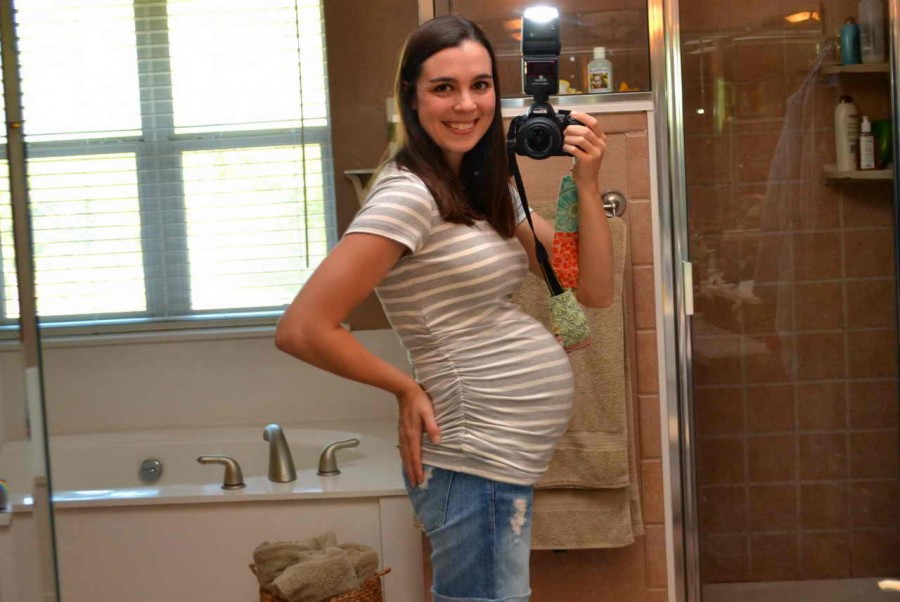 Already after the birth of the child, this shell will allow the child to respond to stimuli from the outside.
Already after the birth of the child, this shell will allow the child to respond to stimuli from the outside.
The appearance of the fetus is already a bit like a newborn baby and is actively approaching this state. Facial features are becoming more and more distinct, the ears that were previously tightly pressed to the head are straightening out, the middle ear is being formed, and its perception is also improving. At this stage of pregnancy, the baby can already perceive stimuli from the outside, respond to all sorts of sounds. The noises that occur in the mother's body due to the active work of the internal organs are quite normal, familiar to him, and also contribute to the training of auditory perception.
It is impossible not to note the intensive work of the endocrine system of the fetus. At 18-19 weeks, the release of "baby" hormones is large enough, which allows even the mother's body to provide them. With a lack of own hormones in the body of a woman, they are compensated at the expense of children, and the mother's condition returns to normal.
Expectant mother
This week, some of the mothers feel the first movements of their baby. Most often, women for whom this is the first child can feel fetal movements at 19-20th week. At earlier periods, namely, at 16-18 weeks, those women who already have their own children, as well as quite thin women with a slight layer of fat under the skin, note the movement.
At the first stages, the movements will be rather weak, brief and episodic, but after a short period of time they will become more distinct and more frequent. The nature of the shocks can be different:
- touches;
- light shocks;
- twitches;
- rolling.
For a woman, her baby's first kicks are very much expected. This is an exciting moment that will allow the expectant mother to remember these pleasant sensations with trepidation, and also as proof of her connection with the child. At the 18th week, the movements of the child are quite chaotic, varied and appear during the wakefulness of the baby.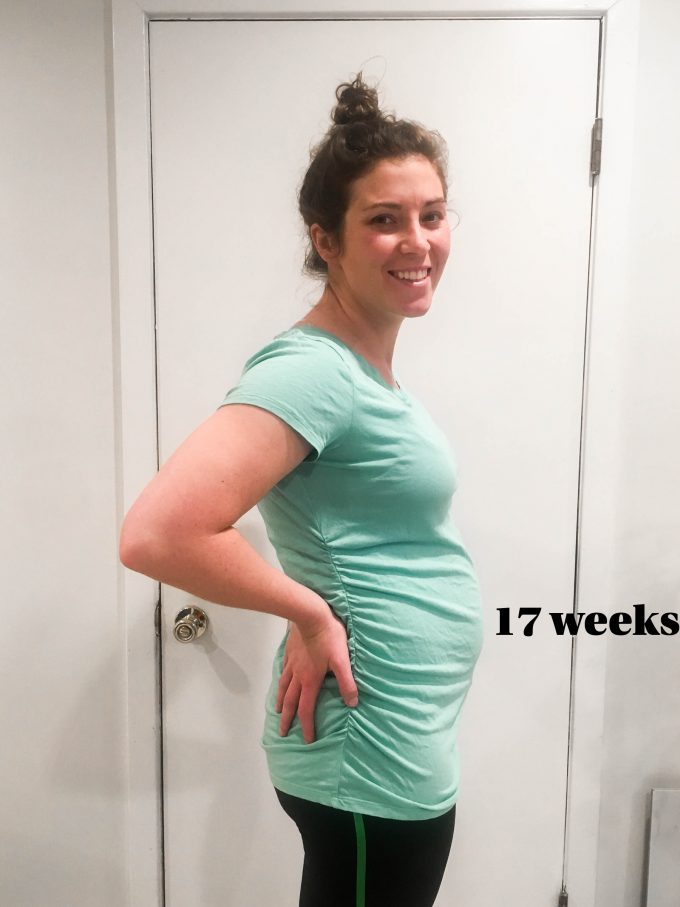 With emotional stress, they can become more intense. Also, the child may report an insufficient amount of oxygen, which occurs due to the lack of movement of a woman, insufficient time spent on the street, as well as when staying in the same position for a long time (driving a vehicle, at work). Most of the time at this stage of development, the fetus sleeps.
With emotional stress, they can become more intense. Also, the child may report an insufficient amount of oxygen, which occurs due to the lack of movement of a woman, insufficient time spent on the street, as well as when staying in the same position for a long time (driving a vehicle, at work). Most of the time at this stage of development, the fetus sleeps.
19th week
Baby
The 19th week is characterized for the fetus by intensive growth of limbs in length, increase in size, slowing down of head growth. Its length is already 25 cm, and its weight is approximately 250-300 g. The child changes greatly in appearance, his body no longer looks disproportionate.
Fat under the skin allows the relief of the torso to change slightly and round. This brown fat is just laid down for a period of 19-20 weeks. After birth, it is he who will perform the function of thermoregulation and protect the child from hypothermia or overheating. With age, this fat disappears and remains only in certain places: in the thickness of a person’s cheeks, in the kidney area, under the armpits, and shoulder blades.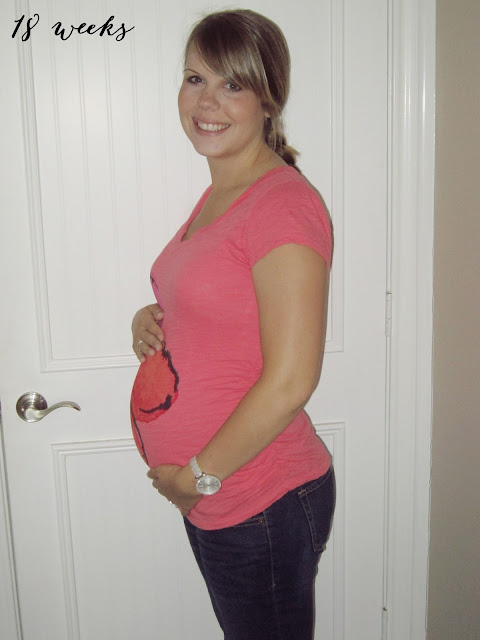
At this time, the laying of permanent teeth, which are located in the dental plate under the rudiments of milk teeth, and the maturation of the brain also take place. Special processes allow you to establish connections between neurons. Cells intertwine with each other and create a whole system for the transmission of impulses, ensure the synchronism of the brain. Structures that are responsible for touch, taste, sight, hearing, and smell are actively developing.
Changes also occur in the hematopoietic system. The spleen is connected to the process of formation of blood cells, produces leukocytes, whose task is to protect the child's body from external and internal factors. Under 19-20 weeks, the fetal blood consisted only of erythrocytes and at this stage its composition changes dramatically and approaches the composition of the blood of a newborn.
Expectant mother
The tummy of the expectant mother is actively growing, and the bottom of the uterus is already located up to 2 cm below the navel. Weight gain is about 3-6 kg and is distributed proportionally between the placenta, uterus, fetus, amniotic fluid. The weight of the fetus is only a tenth of the total added weight.
Weight gain is about 3-6 kg and is distributed proportionally between the placenta, uterus, fetus, amniotic fluid. The weight of the fetus is only a tenth of the total added weight.
Due to the intensive growth of the uterus, a woman may feel discomfort. Often this condition manifests itself when changing the position of the body, bending to the sides, walking. The nature of pain can be different. It can be pulling, sharp, sudden pains that occur both on one side and on both sides. The stretching of the ligaments that are attached to the side walls of the uterus and the pelvic bones in order to fix the uterus is quite active. The uterus of a woman is, as it were, in limbo due to this ligamentous apparatus. When the ligaments are pulled during a change in the position of the uterus, pain occurs.
This kind of pain is quite normal and typical for this period of pregnancy. In critical situations, a gynecologist may recommend that a woman take antispasmodics, which will help to relax the uterus, as well as eliminate the problem of pain almost completely. At the 19th week, it is important for the gynecologist to exclude such risks of pregnancy complications as the threat of miscarriage and uterine hypertonicity. If one of these risks is detected, the expectant mother will be prescribed hospital treatment.
At the 19th week, it is important for the gynecologist to exclude such risks of pregnancy complications as the threat of miscarriage and uterine hypertonicity. If one of these risks is detected, the expectant mother will be prescribed hospital treatment.
20th week
Baby
The body length of the baby at this time is 28 cm and the weight is about 340 g. Until this week of pregnancy, the length of the fetus was measured by calculating its length from the crown to the coccyx. After the 20th week, the specialist includes in the concept of growth the length of not only the body, but also the lower limbs as well.
At this stage of development, the child is quite active, makes numerous movements, since there is enough space in the uterus for him to roll, push off the walls, and other movements. The baby can smile, grab the umbilical cord, feel himself, frown, close his eyes. His facial expressions are quite developed and more pronounced than before.
The skin becomes dense, actively covered with downy hairs and a special lubricant. A large amount of this lubricant is in the folds. This lubricant prevents the risk of mechanical friction, has bactericidal properties, and ensures optimal passage of the fetus through the mother's birth canal during childbirth.
A large amount of this lubricant is in the folds. This lubricant prevents the risk of mechanical friction, has bactericidal properties, and ensures optimal passage of the fetus through the mother's birth canal during childbirth.
It is impossible not to note the intensive development of the gastrointestinal tract. Small portions of amniotic fluid, which the child swallows, wash the walls of the intestines and stomach, lead to the training of peristalsis, and contribute to the contraction of the intestines.
At the 20th week, amniotic fluid is processed. In the body of a child, the first feces - meconium - is formed. It has a dark green color. It consists of mucus, water, epithelial cells, and bile. Accumulation of meconium is carried out in the intestinal lumen. On the first day of birth, it comes out.
Expectant mother
The 20th week is the end of the first half of a woman's pregnancy. Starting from the following weeks, the load on the body of the expectant mother only increases.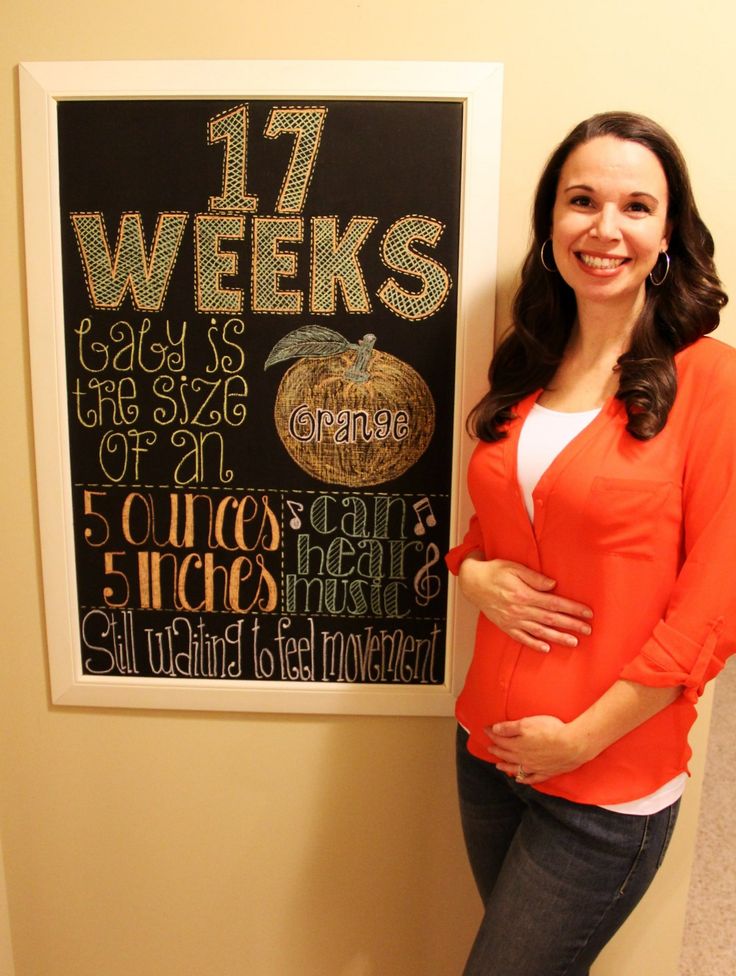 This fact can be explained by the active development of the fetus in the womb.
This fact can be explained by the active development of the fetus in the womb.
The belly of a pregnant woman increases significantly, and the fundus of the uterus is already at the level of the navel. During this period, a woman may complain about the manifestation of symptoms of shortness of breath: after all, the uterus is already beginning to put pressure on the lungs. Also characteristic of this week is an increase in urination. Squeezing of the bladder leads to frequent urination.
The discharge from the woman's vagina also increases. A large blood flow contributes to increased secretion production. The discharge may be mucous or white. It should also be noted that they should not have a foreign unpleasant odor, and also cause itching, burning. Changes in a woman's secretions are an occasion to consult a doctor for advice, because this can signal to the expectant mother about the presence of various kinds of diseases. Curdled, thick, yellow discharge with an unpleasant odor can signal the presence of sexual infections and their exacerbation, a violation of the microflora, and the manifestation of thrush.


